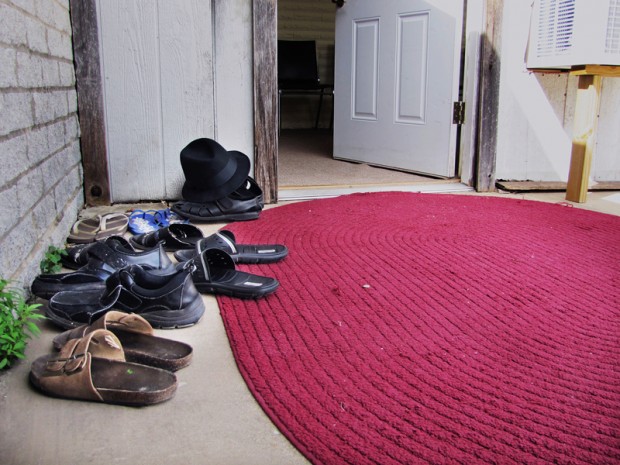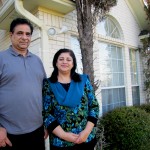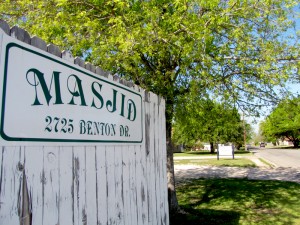
Story and photos by Ashley Yeaman
In a city sprawling with churches, there sits a humble building on Benton street, surrounded by a tall, white fence. The paint is beginning to peel away, and cracked pieces have fallen into the grass. Here, people leave their shoes at the door. With bare feet, they enter a large room with dark green carpet. They kneel and pray, with heads touching the ground. This is a place of worship, a place to revere Allah and praise him.
The Islamic Center of Waco is the core of the Muslim community, a diverse group of young and old, men and women, families and individuals who hail from places like Africa, the Middle East and Central Asia. Many also have grown up in the United States.
Amid a city with deep Christian roots, as well as the home of the oldest Baptist university in the world, these Muslims sometimes feel like outsiders. Yet, in this environment they live their lives, seeking to educate others about their faith, and showing that despite the many differences, they too are Wacoans.
Coming to Waco
More than 25 years ago, Wacoan Al Siddiq left his home in Karachi, Pakistan and traveled to the United States, fueled by a desire to learn more about aviation. He earned a degree in aeronautical engineering as he worked his way through the University of Texas at Arlington as a security guard.

After graduating, Siddiq served in the United States Army, stationed in the U.S. and in Korea. His brother settled in Waco while he was abroad.
Siddiq was honorably discharged and decided in 1987 to live and work in the city his brother called home. In the early ‘90s, his brother returned to Pakistan.
But Siddiq remained in Waco, a city he jokingly describes as “too slow.” Through the years, he, his wife and their three sons have become attached to the city, forming lasting relationships with others.
“I’m not going to ever want to move anywhere,” Siddiq’s wife, Gazala, said. “I love Waco.”
Living in Waco did initially provide challenges for the Siddiqs, particularly in practicing their faith. In their early days in Waco, there were only five or six Muslims.
The small group would worship and pray in different houses each week.
Siddiq wished to establish a “central place where everybody could come” and founded the mosque at its present location, on land donated for that purpose by his brother.
Today, about 300 Muslims live in Waco, and the mosque seeks to serve them, providing a place for worship but also a place to foster the still small but thriving Muslim community here.
Through the ‘90s, Siddiq said that there was little outside interest in the Muslim community.
“People didn’t really care. We were living our lives, they were living theirs. Nobody was interested. People didn’t know,” Siddiq said.
But everything changed after September 11th.
A new world for Waco’s Muslims
In the wake of the attacks on U.S. soil that day, there was a sudden explosion of interest in Islam throughout the country. While this led to more active dialogue about the faith, misunderstandings and stereotypes abounded.
One evening, less than a week after the attacks, two FBI agents knocked on the door of Siddiq’s home in Robinson.
“Somebody complained about me to the FBI, that I was planning to bomb someplace or something,” Siddiq said. “We started talking, and they were at first kind of…the way they act. Then I told them who I was, and I was a U.S. Army veteran, so they started mellowing down. Since then, they’ve visited me over five, six, seven times since 9/11 for different occasions.”
“We were very nervous, and understandably so,” Siddiq said.
But these moments do not define the overall experience of the Siddiqs.
“I don’t have any problems with others, and generally we’re OK, because I get to know people, and they get to know me,” Siddiq said.
Siddiq said presentation is key to abolishing stereotypes and building bridges. Instead of isolating themselves, they should become more connected with the community.
“It just depends on how you mingle with [others],” Siddiq said. “In my case, I try to tell [fellow Muslims] to associate with local people, so they’ll get to know us.”
“It’s the easiest way we can understand each other,” Gazala said.
Looking back, Siddiq feels that the reaction to Muslims after 9/11 has been beneficial overall.
“It’s a positive outcome,” Siddiq said. “A lot of people get to learn what Islam is so they wouldn’t be scared of it.”
Forming an interfaith community
The Waco religious community reached out to Siddiq and other Muslims after 9/11. Siddiq was invited to speak at 7th and James Baptist Church by Dr. Lynn Tatum, a professor at Baylor and a board member of the Greater Waco Interfaith Conference, formed in 1980 under the name the Conference of Christians and Jews in Waco.
This speaking engagement sparked similar events throughout the community. Today, Siddiq has been invited to speak on Islam at more than 52 churches and other local synagogues.
In 2002, the Conference of Christians and Jews in Waco formally became the Greater Waco Interfaith conference, in order to include the growing number of faiths in the area.
This environment of understanding and respect is not one way. Muslims in return have reached out to Christians, Jews and others. Siddiq said the mosque has an “open-door” policy and that others are encouraged to come and see what the Muslim community in Waco is about.
In 2011, the Islamic Center in Waco hosted the second consecutive candlelight vigil to commemorate the 9/11 attacks.

“We plan on continuing that. I invite every faith to come and speak. Last year we had about 400 or 500 people,” Siddiq said.
The month of Ramadan, a Muslim holiday where individuals fast from sunup to sundown, concludes with a celebration marking its end by breaking the fast. Many people of other faiths have participated at Siddiq’s invitation.
The Islamic Center has also provided food for various community events and worked with Habitat for Humanity.
“[This all] builds bridges and brings understanding,” Siddiq said.
Waco’s example
The efforts of Siddiq and the Muslim community have not gone unnoticed.
Usmaan and Subia Ahmad moved to Waco from the San Francisco Bay area in California last summer. Usmaan is currently a graduate student at Baylor, and Subia does freelance work for a non-profit in California.
They arrived in the Texas heat at the conclusion of Ramadan in July last summer, and were amazed at what they saw.
“I really thought that this was going to be a place where we would be discriminated against [as Muslims], and to see that there’s such an interfaith community that’s present in Waco,” Ahmad said. “[At Ramadan], there were probably 40 non-Muslim people from the community who had some religious standing in the community who were there. That really made us feel that these preconceived notions of being in a small Central Texas town were pretty unfounded. They just didn’t exist.”
One thing that Ahmad does see in Waco is a lack of knowledge, but this is changing with increased dialogue between the faiths.
“I’ve encountered some people who really don’t understand the fundamentals of Islam at all,” Ahmad said. “They’re pretty, for a lack of a better word, ignorant about my religion. It can come across as kind of abrupt sometimes. But that’s all gone within three minutes [through conversation],” Ahmad said.
Conversation, in turn, can also help Muslims better understand Christianity. Many terms that are common to Christianity do not exist in the Muslim sense, such as “salvation,” Subia said.
“I haven’t learned very much from my Christian friends to fully understand what [the term “salvation”] entails and what it means and everything behind that,” Subia said. “So for me, it’s been kind of a learning process [in Waco] to get to know more about Christianity and to understand how it relates or differs from Islam.”
To the Ahmads, the interfaith environment and dialogue it fosters set Waco apart as unique.
“The fact that there’s legitimate friendships between people at our mosque and the churches was really interesting to me,” Ahmad said. “There’s an actual relationship that’s being built with the community, and the community seems to be reaching out as well, which is nice to see.”
“More than anything, I think that’s reassuring for somebody moving here to see that. We’re doing our part by reaching out, but they’re extending their hand back to us.”
“I think Waco’s a great example. I mean, I would go back to California and say this is the kind of example we should follow,” Ahmad said.
Siddiq does not deny that there is some prejudice in Waco, but he said usually it is confined to a particular group. More people are open and willing to learn more about Islam.
But within the process of building bridges and creating dialogue, Siddiq said that a respect for individuals to have their own beliefs is essential.
“That’s how we believe, and it’s our firm belief,” Siddiq said. “I don’t know what it will take for me to change my faith, and the same goes for you. So when we all establish that you’re going to be a Christian and I’m going to be a Muslim, we [then] need to delve into some kind of mutual understanding.”
Find more info at: http://www.wacomasjid.org/ ; http://wacointerfaith.org/
